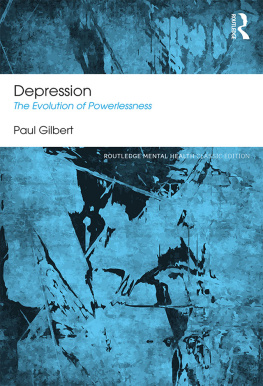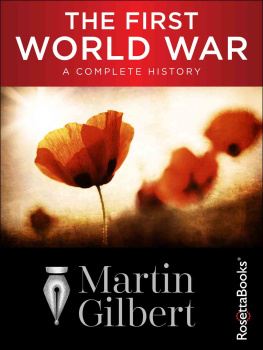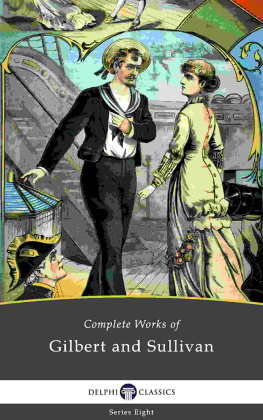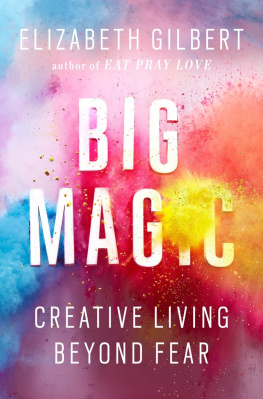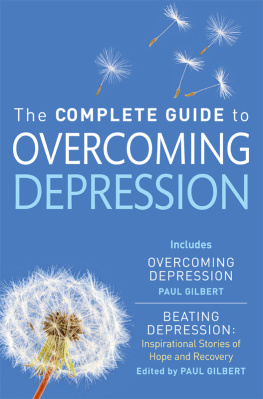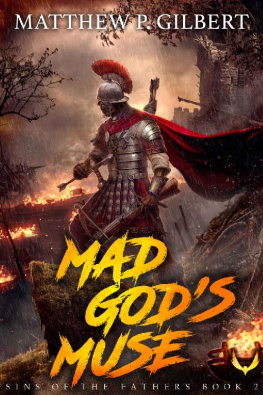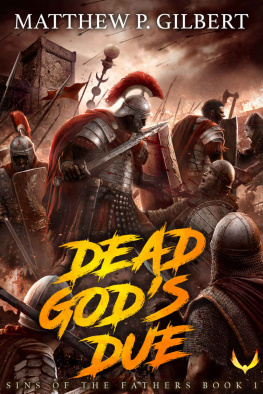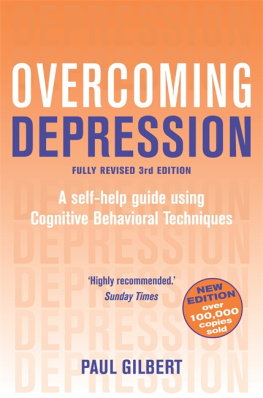Gilbert - Depression: the evolution of powerlessness
Here you can read online Gilbert - Depression: the evolution of powerlessness full text of the book (entire story) in english for free. Download pdf and epub, get meaning, cover and reviews about this ebook. City: Oxfordshire [England];New York, year: 2017, publisher: Routledge, genre: Religion. Description of the work, (preface) as well as reviews are available. Best literature library LitArk.com created for fans of good reading and offers a wide selection of genres:
Romance novel
Science fiction
Adventure
Detective
Science
History
Home and family
Prose
Art
Politics
Computer
Non-fiction
Religion
Business
Children
Humor
Choose a favorite category and find really read worthwhile books. Enjoy immersion in the world of imagination, feel the emotions of the characters or learn something new for yourself, make an fascinating discovery.
Depression: the evolution of powerlessness: summary, description and annotation
We offer to read an annotation, description, summary or preface (depends on what the author of the book "Depression: the evolution of powerlessness" wrote himself). If you haven't found the necessary information about the book — write in the comments, we will try to find it.
Depression: the evolution of powerlessness — read online for free the complete book (whole text) full work
Below is the text of the book, divided by pages. System saving the place of the last page read, allows you to conveniently read the book "Depression: the evolution of powerlessness" online for free, without having to search again every time where you left off. Put a bookmark, and you can go to the page where you finished reading at any time.
Font size:
Interval:
Bookmark:

'Reading this book changed my life as a researcher, guiding me into entirely new lines of inquiry. It provides an extraordinarily wide-ranging and erudite review of psychosocial theories and research about depression, but its greatest contribution is the elaboration of an evolutionarily-informed analysis of depression, especially how losses of rank and status and of social connection with others can activate evolved mechanisms that regulate affect and behavior and thereby trigger the syndrome of depression. Even 25 years later the book contains innumerable rich veins of novel ideas and hypotheses waiting to be mined by researchers and clinicians interested in depression.'
Professor David Zuroff, Department of Psychology, McGill University
Depression: The evolution of powerlessness offers a fresh perspective on research, theory and conceptualisations of the depressive disorders, derived from evolution theory and arguing for the adoption of the biopsychosocial model.
The book is split into three parts. covers the major theories of depression; theories are compared and contrasted, highlighting controversies, weaknesses and strengths, and where cross fertilisation of ideas may be beneficial. The final chapter outlines why simple theories of aetiology are inadequate and explores the role of culture and social relationships as elicitors of many forms of depression.
This Classic Edition, with a new introduction from the author, brings Paul Gilbert's early work to a new audience, and will be of interest to clinicians, researchers and historians in the field of psychology.
Paul Gilbert, OBE, is Professor of Clinical Psychology at the University of Derby and has been actively involved in research and treating people with shame-based and mood disorders for over 30 years. He is a past President of the British Association for Cognitive and Behavioural Psychotherapy and a fellow of the British Psychological Society. He was awarded the OBE for contributions to mental health in 2011.
Routledge Mental Health Classic Edition
The Routledge Mental Health Classic Edition series celebrates Routledges commitment to excellence within the field of mental health. These books are recognized as timeless classics covering a range of important issues, and continue to be recommended as key reading for professionals and students in the area. With a new introduction that explores what has changed since the books were first published, and why these books are as relevant now as ever, the series presents key ideas to a new generation.
The Plural Psyche (Classic Edition)
Personality, morality and the father
Andrew Samuels
Evolutionary Psychiatry (Classic Edition)
A new beginning, second edition
Anthony Stevens and John Price
The Wounded Healer (Classic Edition)
Countertransference from a Jungian perspective
David Sedgwick
Four Approaches to Counselling and Psychotherapy (Classic Edition)
Windy Dryden and Jill Mytton
The Therapeutic Use of Self (Classic Edition)
Counselling practice, research and supervision
Val Wosket
Depression (Classic Edition)
The evolution of powerlessness
Paul Gilbert
Human Nature and Suffering (Classic Edition)
Paul Gilbert
The evolution of powerlessness
Classic Edition
Paul Gilbert

Classic Edition published 2017
by Routledge
2 Park Square, Milton Park, Abingdon, Oxon OX14 4RN
and by Routledge
711 Third Avenue, New York, NY 10017
Routledge is an imprint of the Taylor & Francis Group, an informa business
2017 Paul Gilbert
The right of Paul Gilbert to be identified as author of this work has been asserted by him in accordance with sections 77 and 78 of the Copyright, Designs and Patents Act 1988.
All rights reserved. No part of this book may be reprinted or reproduced or utilised in any form or by any electronic, mechanical, or other means, now known or hereafter invented, including photocopying and recording, or in any information storage or retrieval system, without permission in writing from the publishers.
Trademark notice : Product or corporate names may be trademarks or registered trademarks, and are used only for identification and explanation without intent to infringe.
First edition published 1992 by Routledge
British Library Cataloguing in Publication Data
A catalogue record for this book is available from the British Library
Library of Congress Cataloging-in-Publication Data
Names: Gilbert, Paul, 1951 June 20 author.
Title: Depression: the evolution of powerlessness / Paul Gilbert.
Description: Classic edition. | Milton Park, Abingdon, Oxon; New York, NY: Routledge, 2017. | Includes bibliographical references and index.
Identifiers: LCCN 2016003344 | ISBN 9781138953154 (hbk) | ISBN 9781138953161 (pbk) | ISBN 9781315564319 (ebk)
Subjects: LCSH: Depression, Mental. | Depression, MentalSocial aspects. | Control (Psychology) | Power (Social sciences)
Classification: LCC RC537 .G533 2017 | DDC 616.85/27dc23
LC record available at http://lccn.loc.gov/2016003344
ISBN: 978-1-138-95315-4 (hbk)
ISBN: 978-1-138-95316-1 (pbk)
ISBN: 978-1-315-56431-9 (ebk)
Typeset in Times New Roman
by Apex CoVantage, LLC
With love and affection to Jean, Hannah
and James
May your archetypes serve you well
The rain to the wind said,
you push and Ill pelt.
They so smote the garden bed
that the flowers actually knelt,
and lay lodged though not dead.
I know how they felt.
Robert Frost
| PART I Types: history, diagnoses, epidemiology, and personality |
| PART II Concepts: the evolution of mental mechanisms and the needs for power, belonging, and self-value |
| PART III Past and current theories |
The earlier version of this book, Depression: From Psychology to Brain State , was written twelve years ago but took time to find a publisher. Eventually Michael Forster at LEA came to the rescue. When Depression went out of print Michael came back to me for a second edition. With a desire to explore depression from an evolutionary perspective, I was hooked. I went back to Michael many times. I wanted to change the title and I wanted to expand the size. With persuasion Michael agreed and I am deeply grateful to him.
As a child I could not read until I was ten and my spelling was something else! I mention this to express my deep gratitude to Paul Dukes of LEA and the copy editor, Irene Tuchfeld. They worked tirelessly and without complaint with a manuscript which, in places, was probably unreadable to anyone else but me. My left brain does, of course, accept full responsibility for any remaining errors.
To my family I owe immense gratitude. Jean was always there as a help and support, took interest in how it was going, lifted my spirits when I felt I could not succeed and helped with references and many other things. Hannah and James would also rescue me with cricket on the lawn, snakes and ladders, got me to become a fan of the Gummi bears and other wonders. This book is dedicated to them, for their recognition, love, and constant mirroring.
When I first opened and dismantled the word processor on which I was to produce this book, I hardly dared switch it on. Cognitive distortion or not, I was sure it would blow up. My good friend Dr Dennis Trent set it up and introduced me to the wonders of word-processing. When I phoned him up with Oh God Dennis Ive just lost another chapter, he would speed across and almost by magic find it hiding somewhere on the hard disc, or take it to his system and try to sort it out. It was always the psychoanalytic chapters that played up I wonder why? At work many friends and colleagues got used to me wandering around mumbling about reptiles and monkeys. Dr Chris Gillespie was very supportive and challenging and Barry Greatorex and Chris took to the model alerting me to research and ideas. Dr Haru Ghadiali provided many opportunities to discuss the links with archetype theory and envy, read various chapters and encouraged me to complete the project. Dr Hema Ghadiali also provided many opportunities for discussion and read chapters. Over the years various clinical trainees have passed through my room and they were challenging and excited. Special thanks go to Alistair Atherton, Nick Moore, Julie Pehl, and Steve Allen. The MSc trainees at Leicester and Birmingham Universities have also encouraged me and advised me what they would find helpful in a revised edition. Special thanks also go to Joyce Chantrill for her very hard work helping to sort out the diagrams, her unruffled support, and no problem attitude.
Font size:
Interval:
Bookmark:
Similar books «Depression: the evolution of powerlessness»
Look at similar books to Depression: the evolution of powerlessness. We have selected literature similar in name and meaning in the hope of providing readers with more options to find new, interesting, not yet read works.
Discussion, reviews of the book Depression: the evolution of powerlessness and just readers' own opinions. Leave your comments, write what you think about the work, its meaning or the main characters. Specify what exactly you liked and what you didn't like, and why you think so.

